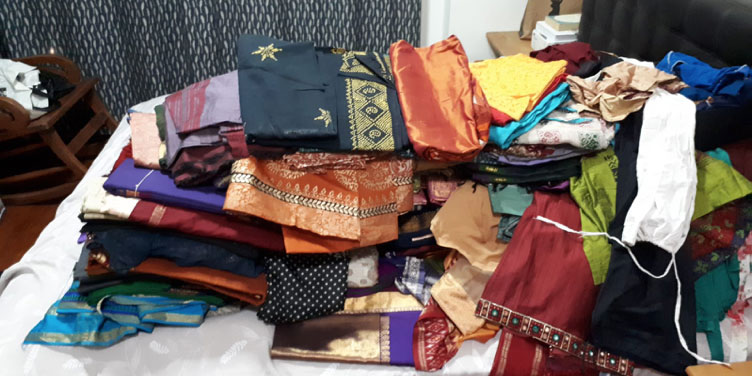Shifting Realities and Diasporic Stories

Photo: Saris in a heap, cultural baggage that the writer found too heavy to carry while coping with the impact of breaking norms of religion, gender, race, and sexuality.
“Sometimes we feel we straddle two cultures; at other times, that we fall between two stools”
~ Salman Rushdie
I listen to my mother tell me stories she has told me many times before, always in the same way. The same words, the same pauses, the same facial expressions, the same rhetorical flourishes. I know these stories by heart. I could repeat them word for word. But they would not come out half as well, because the one thing I lack that she has always had is the sense of certainty that her listeners are caught up in her storytelling. This confidence I do not have. I wonder where this confidence comes from. Perhaps, among other things, from the necessity of fixing her identity in a space where that identity is threatened.
One story she tells is about the time when she and my father told their parents they were leaving India to settle in Singapore, in 1958. Everyone was aghast – where was this place? Did they have basic amenities there? How would this young couple cope, far away from civilisation? No one had heard of the place. My mother’s stories are stories of diaspora. Of a mix of optimism and rupture, of new friendships and struggles to hold on to the known ways.
She tells another story – of a Chinese merchant along North Bridge Road who heard her muttering to my father in Telugu about how they were being fleeced by high prices, and who defended his prices in flawless Telugu that left her flabbergasted. He had learned it, he said, because he had grown up surrounded by Telugu laborers on a rubber plantation in Malaysia. My mother’s stories of diaspora inevitably have caste embedded in them.
Her children have stories of diaspora too. Of a household that attempted to be a fortress of casteist motherland culture as my parents knew it, in an uncertain territory of Others. My siblings and I have told our stories to our friends, recounted them in family gatherings to our own children, nieces, nephews, written them in blog posts and academic papers, unpacked them in therapy…because stories of diaspora are not always happy ones, especially when you have no experience of a motherland yourself.
One story I tell is of my mother oiling my knee-length hair with a home-brewed concoction of hibiscus leaves, coconut oil, and other things. And then washing my hair with soap nut paste, drying it over benzoin resin on hot coals, oiling it again with baby oil, and plaiting it in tight braids. She did this for four daughters once a week for years. Only to have us all chop our hair off when we left home. Diasporic stories are stories of breakage.
My children have their stories too, but I will leave them to tell of the wounds and openings they have experienced, the possibilities that they see, the future they want to create.